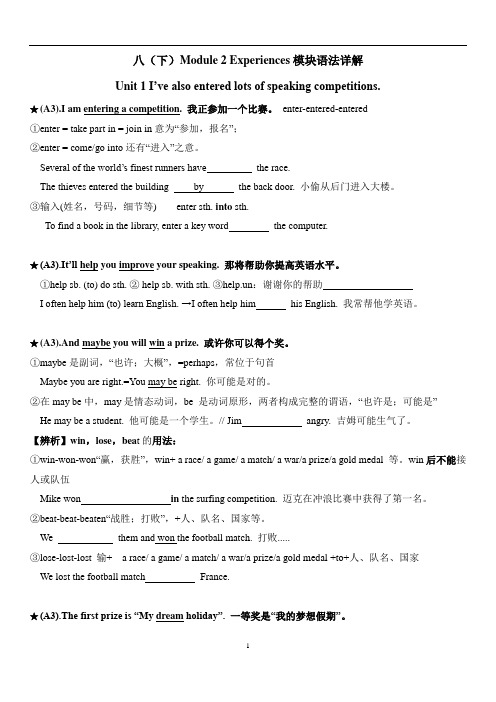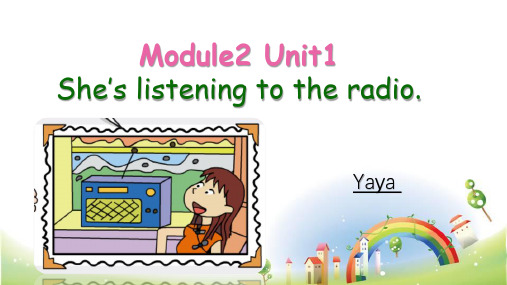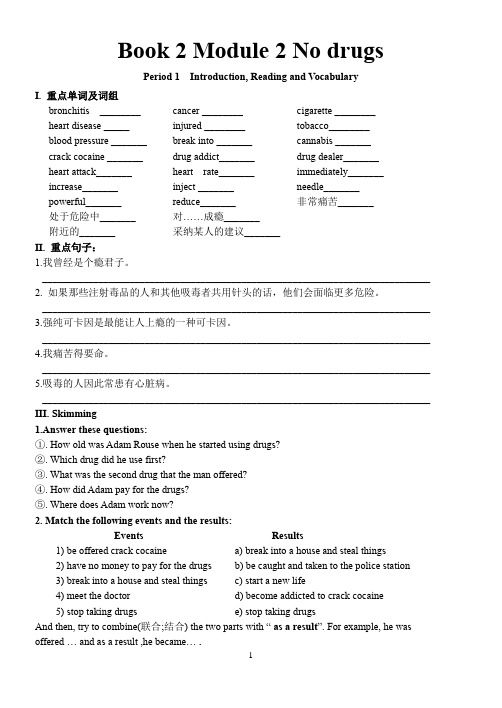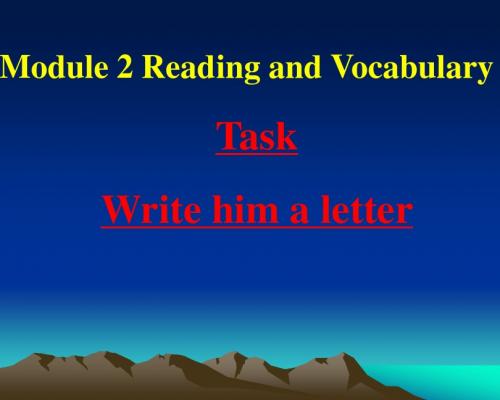Book2Module2 Listening
外研版Book2听力原文

Book 2 Module1Listening1:doctor: Hello, Mr. Chen, how can I help you?mr chen: I'm not feeling at all well, doctor. In fact, I feel awful. I've got a temperature of 38°C and my chest hurts when I breathe.doctor: How long have you had the temperature? Two or three days?mr. chen: About four days, actually.doctor: Four days. Do you have any other symptoms?mr. chen: Yes, I've got a sore throat and a cough.doctor: Can you lie down, please, and I'll examine you? ... Can you take a deep breath? ... And another one ...doctor: Well, I'm afraid you've probably got pneumonia. We'll need to do an X-ray to be certain, and we may need to take you into hospital.mr. chen: Oh dear!doctor: Don't worry. Nowadays, with the right drugs, people get better very rapidly. I'll write you a prescription. Are you allergic to penicillin?mr. chen: No, I'm not.doctor: Good. Is there someone who can take you to hospital?mr. chen: A friend of ours is in hospital at the moment and my wife's going to visit her this afternoon. She can take me in at the same time.doctor: That couldn't be better. And how are you planning to get home now?mr. chen: My wife's going to pick me up in a quarter of an hour.doctor: Jolly good. I'll write a note for your employer saying that you're sick. And I'll ring the hospital and arrange that X-ray for you.mr. chen: How long will I be off work? About a week?doctor: No, I should imagine about two weeks, at least.mr. chen: Two weeks! Well, thank you, doctor.doctor: Goodbye, Mr. Chen.Book 2 Module2Listening1:interviewer: Good evening, and welcome to the show. With me in the studio is Professor Marion Smith, who is an expert on the connection between crime and drug addiction. Good evening, Professor Smith.professor: Good evening.interviewer: First of all, how many people use illegal drugs in Britain?professor: Possibly four million people.interviewer: Really? Four million?professor: Yes.interviewer: How many of them break the law in order to pay for their drugs?professor: We estimate that a hundred thousand people steal in order to pay for their drug addiction.interviewer: A hundred thousand?! That's incredible! And what kind of crimes do they commit? professor: Mainly shoplifting—in other words, stealing from shops—and burglary, stealing from houses.interviewer: I see.professor: And there's another problem. Drug users get into trouble with the police for other reasons as well.interviewer: What kind of reasons?professor: Well, you often see drug users in public places—shopping centres, railway stations, for example—and some of them behave so badly that members of the public call the police. Some people feel so nervous when they see drug users that they call the police anyway.interviewer: This is a really bad problem, isn't it?professor: Absolutely, but the good news is that drug users who go to treatment centres usually stop their criminal activities.interviewer: How many addicts go to treatment centres?professor: Last year, about 30,000 people attended drug treatment centres.interviewer: Thirty thousand? That's amazing.professor: Yes, there are such a lot of people that there isn't time to help them all.interviewer: What kind of people are they?professor: Well, the majority are young people in their twenties. And about 75 percent of the young people are men.interviewer: And do all these people live in cities?professor: Oh no. The ratio of drug users in society is the same in cities and in the countryside. But they all have something in common.interviewer: What's that?professor: Drug users are more likely to get into trouble at school.interviewer: Professor Marion Smith, thank you very much.professor: Thank you.Book 2 Module3Listening1:The Beatles were the most successful band in the history of popular music. The band consisted of John Lennon, Paul McCartney, George Harrison and Ringo Starr. Starr played drums, the other three played guitar. Lennon and McCartney wrote most of the songs. All the Beatles were born in Liverpool in the north of England.During the early 1960s, the Beatles were influenced by American rock singers, such as Chuck Berry and Elvis Presley. They had their first hit in 1962 with a catchy song called Love Me Do (1962). In 1964, after they had become stars in their own country, the Beatles toured the United States and were a huge success.During the mid-1960s, the Beatles were one of the bands which gave rock music a new direction. Some of their songs were quite serious, such as Nowhere Man; there were ballads such as Yesterday and more complex songs such as Strawberry Fields Forever.By the late 1960s, their music had changed completely. They had stopped writing simple songs with catchy tunes. The tunes and the lyrics had become more interesting and they had begun to use new instruments, too. For example, after visiting India, they started using Indian instruments. Some of their albums changed pop music completely. Their last album was Let It Be in 1970. After they had finished recording Let It Be, they split up. By the time they stopped working together, they had sold more albums than any other band in history. After the group had broken up, all the Beatles performed as solo artists or started other bands.John Lennon died in New York in 1980. George Harrison died in 2001.Book 2 Module4:Listening1:girl: Hey, that's a good portrait. It's so realistic. You've really got the expression right—the look in the eyes.boy: Yes, I'm pleased with it. What do you make of the mouth? Do you think I need to do more work on it?girl: No, don't change a thing. It's brilliant. And the light coming in through the window is really good. You are a good painter, you know.boy: Thanks for the compliment! I'm really fond of painting. But learning to paint well takes a long time. How about you, are you interested in it?girl: Yes, but I'm not half as good as you. Painting is difficult for me. I couldn't possibly paint a portrait as good as this. I think drawing's a lot easier. I do quite a lot of drawing.boy: So do I. I always learn a lot when I draw. It teaches you to observe things very carefully. Do you go to art galleries?girl: No, I don't. But I should, I know. I really do love art.boy: Well, how about going to an art gallery next weekend? I'm sure we can find something interesting.girl: I'd love to.boy: There's a pop art exhibition on at the moment.girl: Um, I don't like pop art.boy: Nor do I, really. I know, there's an exhibition of watercolours on at the same gallery.girl: Oh, that sounds interesting. I love watercolours.boy: Do you? I prefer oil paintings, myself. But I'd still like to go.girl: Let's do that then ... And I do think your picture of Mike is wonderful.boy: Mike? It's not a picture of Mike! It's a picture of Paul!girl: Paul? It's a picture of Paul? Oh! I didn't realise that. Sorry!Book 2 Module5:interviewer: I'm talking to Tom Johnson, who has just made a film in Hollywood. Welcome, Tom. tom johnson: Thank you. It's very nice to be here.interviewer: So, you're an English theatre actor, but you've just come back from making a film in Hollywood.tom johnson: That's right.interviewer: How did you get the part?tom johnson: Well, I was working in a play in New York and the director of the film came to see it. Actually, she came to see another actor in the play.interviewer: I see. And then what happened?tom johnson: Well, at the end of the play, she came backstage to talk to the other actor. interviewer: I see.tom johnson: And my dressing room was next to his, so after she'd talked to him, she talked to me. interviewer: And what did she say?tom johnson: She said,"why don't you fly to Hollywood and we'll give you a screen test." interviewer: And what did you say?tom johnson: I said,"Yes,of course!" So I went to Hollywood and did a screen test. Then I flew back to New York and carried on with the play.interviewer: What were you doing when you heard that you had got the part?tom johnson: I was sleeping! When she rang, I was asleep. Anyway, I stopped doing the play and flew back to Hollywood.interviewer: What did you do when you arrived in Hollywood?tom johnson: I went to stay in a smart hotel.interviewer: What did you think when you arrived at the film studio?tom johnson: I thought it was great. I was a bit nervous but it was all very exciting.Book 2 Module6:interviewer: Do you have a television in your home?boy: Sure! We've got two, one in the sitting room and a small one in the kitchen. We always watch telly in the morning in the kitchen as we eat our breakfast.interviewer: Really! How often do you watch?boy: Watch the box? I watch it every night for about two hours. And sometimes, when my parents are out, I watch it non-stop all evening, I'm afraid to say. I love it; it's the way I relax. My mum says I watch too much, but I disagree. I think you can learn a lot from television. There was a programme about homeless people last weekend that was really interesting.interviewer: Do you watch a lot of films on television?boy: I watch films all the time at the weekend. It's one of the most relaxing things you can do when you're tired or bored.interviewer: I see! How often do you change channels in an evening?boy: Quite a lot. If we're all watching, we often argue about which programme we want to watch. My parents like serious programmes like the news, but I prefer comedy programmes. interviewer: Do you enjoy advertisements?boy: Yes, I do, I think they can be very interesting. I saw an excellent one yesterday. When I leave school, I want to work in advertising.interviewer: Good for you! What's your favourite TV programme?boy: I love watching Neighbours. Everyone in it acts so brilliantly. I have to find out what's happening to the characters. They seem so real!interviewer: So what's on TV tonight? Anything good?boy: Absolutely! Neighbours!。
Module2知识点详解-挖空-2022-2023学年人外研版八年级英语下册

八(下)Module 2 Experiences模块语法详解Unit 1 I’ve also entered lots of speaking competitions.★(A3).I am entering a competition. 我正参加一个比赛。
enter-entered-entered①enter = take part in = join in意为“参加,报名”;②enter = come/go into还有“进入”之意。
Several of the world’s finest runners have the race.The thieves entered the building by the back door. 小偷从后门进入大楼。
③输入(姓名,号码,细节等) enter sth. into sth.To find a book in the library, enter a key word the computer.★(A3).It’ll help you improve your speaking. 那将帮助你提高英语水平。
①help sb. (to) do sth. ② help sb. with sth. ③help.un:谢谢你的帮助I often help him (to) learn English. →I often h elp him his English. 我常帮他学英语。
★(A3).And maybe you will win a prize. 或许你可以得个奖。
①maybe是副词,“也许;大概”,=perhaps,常位于句首Maybe you are right.=You may be right. 你可能是对的。
②在may be中,may是情态动词,be 是动词原形,两者构成完整的谓语,“也许是;可能是”He may be a student. 他可能是一个学生。
Module2Unit1She'slisteningtotheradio.(课件)(一起)英语二年级

playing football
正在踢足球
playing the piano
正在弹钢琴
camera 相机
And this is my new camera. Smile, please!
这是我的新相机。请微笑吧!
Pair work(两人一组练习): A:That is your _________. B: Yes. She/he’s _________.
是的,她正在听收音机。
listening to the radio
正在听收音机
That is your father.
那是你的爸爸。
Yes. He’s reading a newspaper.
是的,他正在看报纸。
reading a newspaper 正在看报纸
reading a book /reading books
playing the piano
playing football listening to the radio
playing with his car reading books
swimming
Read and underline the “-i音朗读课文。 2. 模仿课文句子说一说你的家人正在做什么。
正在看书/阅读
And this is your little brother.
还有这是你的小弟弟。
Oh, yes! Tom’s playing with his train.
噢,是的。他正在玩他的小火车。
playing with his train
正在玩他的小火车
playing with his car
Module2 Unit1 She’s listening to the radio.
外研版book 2 module 2学案及答案

Book 2 Module 2 No drugsPeriod 1 Introduction, Reading and VocabularyI. 重点单词及词组bronchitis ________ cancer ________ cigarette ________heart disease _____ injured ________ tobacco________blood pressure _______ break into _______ cannabis _______crack cocaine _______ drug addict_______ drug dealer_______heart attack_______ heart rate_______ immediately_______increase_______ inject _______ needle_______powerful_______ reduce_______ 非常痛苦_______处于危险中_______ 对……成瘾_______附近的_______ 采纳某人的建议_______II.重点句子:1.我曾经是个瘾君子。
____________________________________________________________________________ 2. 如果那些注射毒品的人和其他吸毒者共用针头的话,他们会面临更多危险。
____________________________________________________________________________ 3.强纯可卡因是最能让人上瘾的一种可卡因。
____________________________________________________________________________ 4.我痛苦得要命。
____________________________________________________________________________ 5.吸毒的人因此常患有心脏病。
英语一轮复习导学案 Book 2 Module 2(外研)

Book2 Module2 No drugsI. Learning aims(学习目标):1. 基础知识的应用与提升2. 重点句型的运用提升与巩固II. Link to NMET (高考链接):1. addicted2. to do/ in order to / so as to 引导目的状语从句课前热身:Being addicted to the Internet is a danger to teenagers because it will affect their lives and study. In fact, it is the cause of their distraction. It reduces their communication with other people. Some of them are likely to commit a crime or take illegal actions in order to get enough money to go to the net bar.预习案Self- study使用说明:上课前先对本模块基本内容进行初步复习,独立完成单词、短语,补全句子并背诵。
I. words:1. 对…上瘾的人______2. 上瘾的_________3. 危险_________4. 危险的_____________5. 有力的,有功效的________6. 减少_________7. 罪行_________8.成人___________9. 关系,联系___________ 10. 可能的(adj )___________ 11.不同意________________ 12.建议(n)__________(v) ____________ 13. 禁止_________ 14. 影响_______________ 15.提供________________ 16. 认识,认出__________ 17.分心_________ 18.注射_________ 19. 罪犯__________ 20. 治疗__________ 21.禁止,禁令_____ 22. 药品,毒品_________ 23.有关系的,有关联的________________ 24. participant __________25. pain __________ 26. treatment __________27. nearby _________ 28. illegal __________II.Phrases:1. 由于______________________2. 与…有关___________________3. 死于___________4. 闯入,破门而入_____________5. 吸毒成瘾者__________6. 贩毒者_________7. 吸毒_______8. 心脏病发作____________9. 在危险中__________10. 与…分享____________ 11. 对…上瘾_________12. 在疼痛中__________ 13. take/follow one’s advice ___________ 14. break the law ________15.set a date __________ 16. give up /stop smoking ___________ 17. 属于____________18. 培养兴趣__________III. Sentences1.It’s _______________________ (可能的)that he will come back next week.2.________(无论什么) you are doing when you want to smoke, do something else!3._________________________(我非常同意。
外研版Book2 Module2 Reading

Read Article 2, part 1 and part4
powerfully addictive drug, Cocaine is a ___________ of which crack cocaine is the most addictive. inject cocaine, others Some drug users ______ smoke _____ it. Both ways aredangerous _______. Users become addicted to crack cocaine more easily by smoking it, which ________cocaine allow to reach the brain quickly. Using cocaine increases the user’s hear rate and blood pressure and causes anti-social_________. behaviour
Article 1
Parts 2,3
Because he didn’t have enough ______money to in terrible pain get more crack cocaine, he was___________. The next day, he broke ____ ____ into a house and get stole valuable things in order to____money. _____ He became ________ addicted to crack cocaine. pay for From then on, he stole every day to______ the drugs, and was finally taken ____ to the police station. stop taking A doctor helped him to ______ drugs. Now He is working in a ______ centre for drug addicts, helping _______ them to stop taking drugs.
【精选】外研版四年级下册英语第二单元Module 2测试卷(含听力材料及参考答案)

【精选】外研版四年级下册英语第二单元Module 2测试卷(含听力材料及参考答案)时间:40分钟满分:100分题号一二三四五六七八九十总分得分听力部分 (40分)一、听句子, 给下列图片排序。
(10 分)二、听句子, 选出与你所听内容相符的图片。
(10 分)( ) 1. A. B.( ) 2. A. B.( ) 3. A. B.( ) 4. A. B.( ) 5. A. B.三、听句子, 选出你所听到的内容。
(10 分)( ) 1. A. Is this your house ? B. Is it your house ?( ) 2. A. It’s very big and very beautiful.B. It’s very tall and very beautiful.( ) 3. A. Whose house is it ? B. What’s that ?( ) 4. A. This is Hyde Park. B. This is Tower Bridge.( ) 5. A. It’s very famous. B. It’s very small.四、听问句, 选出正确的答语。
(10 分)( ) 1. A. It’s Tom’s. B. It’s Buckingham Palace.( ) 2. A. No, it isn’t. B. No, she isn’t.( ) 3. A. It’s the Queen’s house. B. The house is beautiful.( ) 4. A. It’s a book. B. It’s about Beijing.( ) 5. A. No, he isn’t. B. Yes, it is.笔试部分(60分)五、选出可以替换画线部分的选项。
(10 分)( ) 1. London is a big city.A. beautifulB. whoseC. about( ) 2. This is my new bike.A. veryB. oldC. ship( ) 3. Big Ben is very famous.A. homeB. oldC. house( ) 4. My home is near our school.A. onB. close toC. about( ) 5. What’s this ?A. oneB. it’sC. that六、粗心的Taotao 总是记不清单词里字母的顺序。
新人教版Book2Unit1 listening and speaking(定稿版)

Module2 Unit1 Cultural HeritageListening and Speaking一、主题语境:人与社会——文化遗产二、课程类型(课型):Listening and Speaking三、内容分析:本单元的话题内容是“文化遗产”,它属于“人与社会”这一主题语境下的“历史、社会与文化”。
听力文本是关于一个国际青少年文化遗产保护项目的采访。
采访围绕三个主要内容展开:国际青少年文化保护项目介绍,选择泰山作为项目开展地点的原因,以及他们保护泰山文化遗产的具体做法。
文本指出了保护文化遗产的重要性,以及文化遗产保护的历史和现状,并号召学生积极参与文化遗产保护活动。
学生通过听力文本中对青少年参与文化遗产保护的描述,了解文化遗产保护的意义,以及青少年可以运用所学知识、结合自身兴趣和优势等,参与文化遗产保护中的行动中。
这些内容与学生的社会生活有关,有助于学生在语言知识、文化意识、思维品质等方面能力的提高。
四、学情分析及目标设定本节授课对象为高一学生。
经过新教材必修一的学习,学生们已对新教材单元整体学习的意识已初步形成。
但学生在听说环节还是比较薄弱,未能很熟悉掌握相关的听力策略,如预测听力文本,根据听力内容猜测重要的词汇等,需老师层层引导,才能更好理解听力文本,为后面口头输出就文化遗产保护进行探讨、发表自己想法做铺垫。
基于以上学情,围绕单元主题,依据新课程理念,确定本节教学目标为:通过本课学习,学生能够1)根据图片发散思维,预测听力文本的内容并能够从整体和关键细节两方面理解听力文本内容。
2)获得根据上下文猜测词汇的能力。
3)利用教材新闻材料模仿朗读,能够正确发好辅音连缀词汇(gr, cr, pr etc.)。
4)通过听力文本内容学习,提升文化遗产保护意识和增强民族自豪感,并能与同伴探讨参与文化遗产保护活动的方式。
五、教学设计理念:听力活动设计第一环节,通过图片引入,引导学生从不同角度思考预测听力文本内容,是相关知识体验的激活和准备阶段,梳理思维,帮助学生降低听力难度,为后面更好从整体和关键细节两方面理解听力文本内容做好铺垫。
- 1、下载文档前请自行甄别文档内容的完整性,平台不提供额外的编辑、内容补充、找答案等附加服务。
- 2、"仅部分预览"的文档,不可在线预览部分如存在完整性等问题,可反馈申请退款(可完整预览的文档不适用该条件!)。
- 3、如文档侵犯您的权益,请联系客服反馈,我们会尽快为您处理(人工客服工作时间:9:00-18:30)。
Period 6 Listening, pronunciation, Everyday English
Teaching Goals:
1. Knowledge and skills:
1) To learn some skills of listening.
2) Learn the meaning of some expressions.
3) learn to describe the agreement and disagreement.
2. Course and methods
Listen carefully to catch the important points
3. Emotion and value:
Train students’ listening and learn to express the ir
mood or feeling by using different intonations. Teaching important and difficult points:
Teach students how to improve their listening skills. Teaching methods:
Individual work,pair work
Teaching procedures:
Step 1. Revision
1) Ask Ss to check the answers to yesterday’s
homework.
2).Go over the new words of listening.
Step2 Listening
1.Activity 1
Read the following words,check the meaning of them and answer the questions.
This activity prensent to the Ss several words appearing
in the listening material. Make sure there is no obstacle while listening on P15.
1.Listen to the conversation and answer the questions
on textbook P15 Ex2
2.Activity3
Listen again and complete these sentences. P16(见
课件)
1.It’s possible that a hundred thousand people steal
in order ________________
2.some of them behave so badly that members of
the public_________________
3.some people feel so nervous when they see drug
user that they________________
4. There are such a lot of people that there isn’t
time____________
5.Drug user are more likely to_________________
suggest answer:
1.pay for their drug addiction
2.call the polite
3.call the polite anyway
4.to help them all
5.get into trouble at school
Step 3 Pronunciation:
Listen to the sentence with different intonation and decide if the speaker is. Make sure the Ss know the four feelings.
Step4.Finish Everyday English Textbook P18:
1.Activity 1
Read the expressions you can use when you agree or disagree with someone .Write numbers ti indicate how strong the agreement or disagreement is.
2.Activity 2 on P18
Complete the sentences with expressions from activity 1.(见课件)
Step 5 Homework:Finish the exercises in《创新设计》P38-39 感谢您的阅读,祝您生活愉快。
